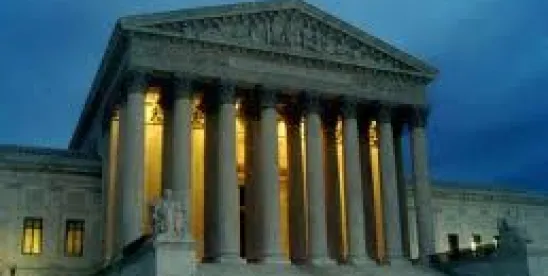Holding in Phoebe Putney case narrowly construes state-action exemption to antitrust laws.
On February 19, in Federal Trade Commission v. Phoebe Putney Health System, Inc.,[1] the U.S. Supreme Court unanimously reversed a decision by the U.S. Court of Appeals for the Eleventh Circuit that adopted a broad view of state-action immunity from antitrust laws.[2] Siding with the Federal Trade Commission (FTC) in its challenge to the merger of the only two hospitals in a county in Georgia, the Supreme Court held that the antitrust laws apply to anticompetitive actions of state and local governmental entities unless the state itself clearly expresses an intent to displace competition.
Background
Both the district court and the Eleventh Circuit agreed with the FTC that the merger to monopoly would likely reduce competition. However, they reasoned that, because the Georgia legislature had given local hospital authorities—such as the defendant, Hospital Authority of Albany-Dougherty County—the power to acquire hospitals, it must have foreseen that some such acquisitions might be anticompetitive. The lower courts, therefore, reasoned that the anticompetitive effects of the acquisition were the actions of the state and not reachable by federal antitrust laws.
Supreme Court Ruling
The Supreme Court reversed the lower courts' decisions, holding that a state legislature's mere grant of general corporate powers to a subordinate state entity did not immunize that entity from the antitrust laws when it used those powers anticompetitively. The state-action immunity doctrine exempts private conduct and the conduct of subordinate state entities from federal antitrust laws when a state has a clearly articulated policy to supplant competition (and, in the case of private parties, when the state also actively supervises the anticompetitive activity). The Supreme Court determined that an anticompetitive acquisition was not "undertaken pursuant to a 'clearly articulated and affirmatively expressed' state policy to displace competition" because, to pass the "clear articulation test," the anticompetitive effect must be a "foreseeable result" of what the state authorized, and the foreseeability test is not met when an anticompetitive outcome is only one of many ways in which the authority might be exercised.[3]
The Georgia legislation authorized the public hospital authorities to undertake all the activities of a business. However, as the Supreme Court explained, the legislation did not authorize the hospital authorities to undertake those activities in an anticompetitive manner: "[N]othing in the Law or any other provision of Georgia law clearly articulates a state policy to allow authorities to exercise their general corporate powers, including their acquisition power, without regard to negative effects on competition."[4]
The Supreme Court noted that its opinion does not require state legislatures to explicitly authorize specific anticompetitive effects before state-action immunity could apply, but it explained that a state policy to displace federal antitrust laws was "sufficiently expressed where the displacement of competition was the inherent, logical, or ordinary result of the exercise of authority delegated by the state legislature."[5] Here, the Court reasoned that the power to acquire hospitals does not ordinarily produce anticompetitive effects and thus the anticompetitive effect was not a logical result of its authority that would be protected under the state-action doctrine.
Implications
The Supreme Court's unanimous decision reversing the lower courts' decisions is a strong reminder that exemptions to the antitrust laws are construed narrowly and that general authorizations of activities cannot be assumed to extend to anticompetitive behavior. Rather, exemptions must be clear and explicit.
[1]. Fed. Trade Comm'n v. Phoebe Putney Health Sys., No. 11-1160 (U.S. Feb. 19, 2013), available here.
[2]. Antitrust partner Willard K. Tom was General Counsel of the FTC when the petition for certiorari was filed in the Supreme Court.
[3]. Phoebe Putney, slip op. at 8-9 (quoting Cmty. Commc'ns Co. v. Boulder, 455 U.S. 40, 52 (1982)).
[4]. Id. at 16.
[5]. Id. at 11.



 />i
/>i
